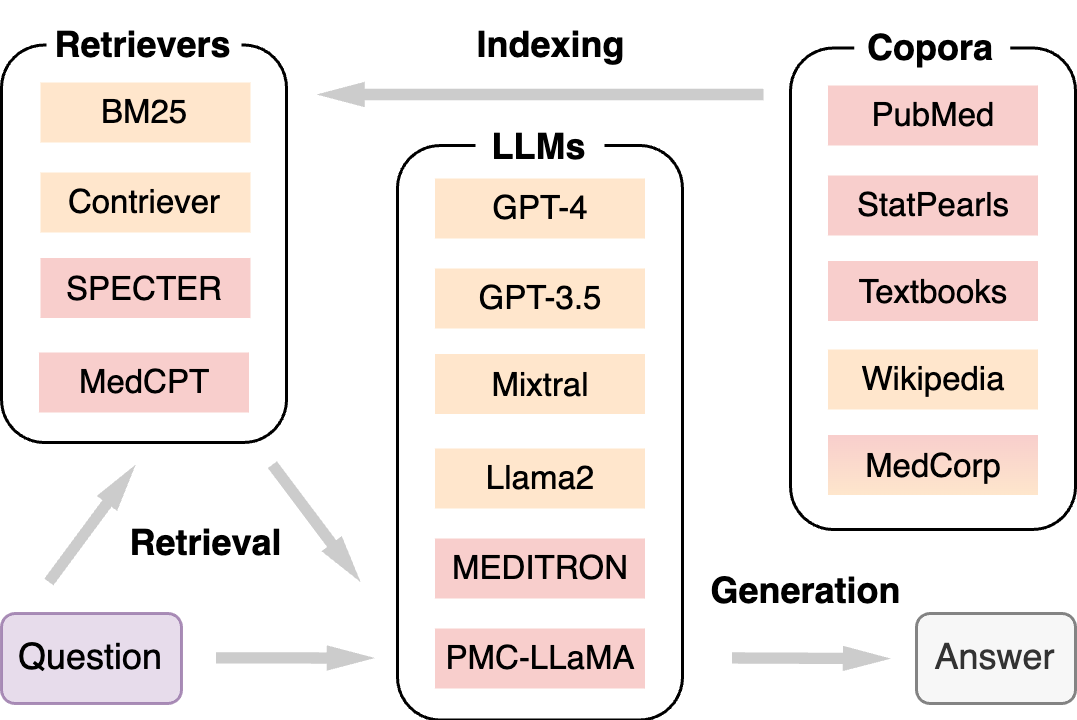MedRAG a systematic toolkit for Retrieval-Augmented Generation (RAG) on medical question answering (QA). MedRAG is used to implement various RAG systems for the benchmark study on our MIRAGE (Medical Information Retrieval-Augmented Generation Evaluation).
The following figure shows that MedRAG consists of three major components: Corpora, Retrievers, and LLMs.
For corpora used in MedRAG, we collect raw data from four different sources, including the commonly used PubMed for all biomedical abstracts, StatPearls for clinical decision support, medical Textbooks for domain-specific knowledge, and Wikipedia for general knowledge. We also provide a MedCorp corpus by combining all four corpora, facilitating cross-source retrieval. Each corpus is chunked into short snippets.
| Corpus | #Doc. | #Snippets | Avg. L | Domain |
|---|---|---|---|---|
| PubMed | 23.9M | 23.9M | 296 | Biomed. |
| StatPearls | 9.3k | 301.2k | 119 | Clinics |
| Textbooks | 18 | 125.8k | 182 | Medicine |
| Wikipedia | 6.5M | 29.9M | 162 | General |
| MedCorp | 30.4M | 54.2M | 221 | Mixed |
(#Doc.: numbers of raw documents; #Snippets: numbers of snippets (chunks); Avg. L: average length of snippets.)
For the retrieval algorithms, we only select some representative ones in MedRAG, including a lexical retriever (BM25), a general-domain semantic retriever (Contriever), a scientific-domain retriever (SPECTER), and a biomedical-domain retriever (MedCPT).
| Retriever | Type | Size | Metric | Domain |
|---|---|---|---|---|
| BM25 | Lexical | -- | BM25 | General |
| Contriever | Semantic | 110M | IP | General |
| SPECTER | Semantic | 110M | L2 | Scientific |
| MedCPT | Semantic | 109M | IP | Biomed. |
(IP: inner product; L2: L2 norm)
We select several frequently used LLMs in MedRAG, including the commercial GPT-3.5 and GPT-4, the open-source Mixtral and Llama2, and the biomedical domain-specific MEDITRON and PMC-LLaMA. Temperatures are set to 0 for deterministic outputs.
| LLM | Size | Context | Open | Domain |
|---|---|---|---|---|
| GPT-4 | N/A | 32,768 | No | General |
| GPT-3.5 | N/A | 16,384 | No | General |
| Mixtral | 8×7B | 32,768 | Yes | General |
| Llama2 | 70B | 4,096 | Yes | General |
| MEDITRON | 70B | 4,096 | Yes | Biomed. |
| PMC-LLaMA | 13B | 2,048 | Yes | Biomed. |
(Context: context length of the LLM; Open: Open-source.)
-
First, install PyTorch suitable for your system's CUDA version by following the official instructions (2.1.1+cu121 in our case).
-
Then, install the remaining requirements using:
pip install -r requirements.txt, -
For GPT-3.5/GPT-4, an OpenAI API key is needed. Replace the placeholder with your key in
src/config.py. -
Git-lfs is required to download and load corpora for the first time.
-
Java is requried for using BM25.
Currently, we provide supports for single corpora and retrievers.
from src.medrag import MedRAG
question = "A lesion causing compression of the facial nerve at the stylomastoid foramen will cause ipsilateral"
options = {
"A": "paralysis of the facial muscles.",
"B": "paralysis of the facial muscles and loss of taste.",
"C": "paralysis of the facial muscles, loss of taste and lacrimation.",
"D": "paralysis of the facial muscles, loss of taste, lacrimation and decreased salivation."
}
## CoT Prompting
cot = MedRAG(llm_name="OpenAI/gpt-3.5-turbo-16k", rag=False)
answer, _, _ = cot.answer(question=question, options=options)
## MedRAG
medrag = MedRAG(llm_name="OpenAI/gpt-3.5-turbo-16k", rag=True, retriever_name="MedCPT", corpus_name="Textbooks")
answer, snippets, scores = medrag.answer(question=question, options=options, k=32) # scores are given by the retrieval system@article{xiong2024benchmarking,
title={Benchmarking Retrieval-Augmented Generation for Medicine},
author={Guangzhi Xiong and Qiao Jin and Zhiyong Lu and Aidong Zhang},
journal={arXiv preprint arXiv:2402.13178},
year={2024}
}
